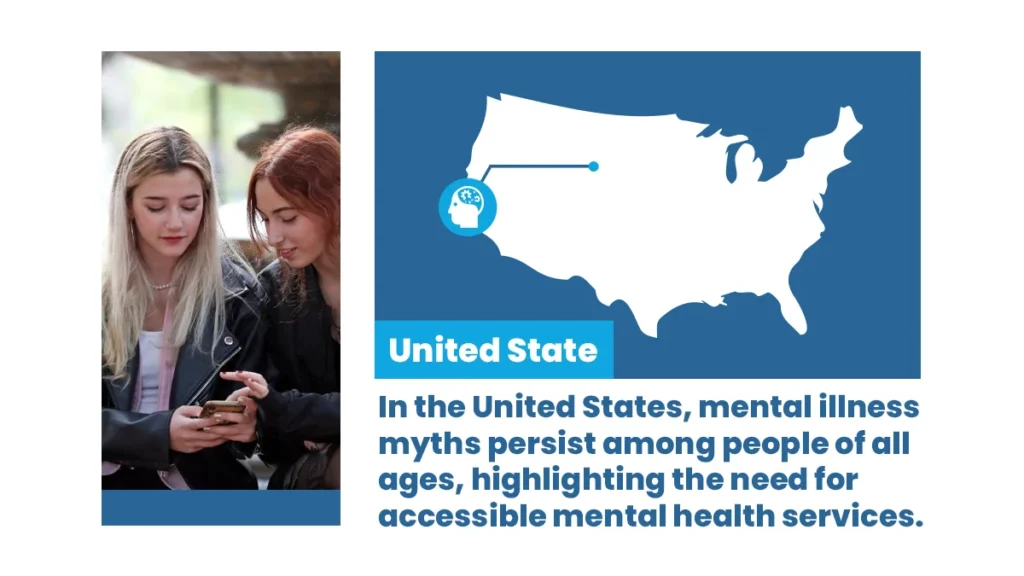Mental illness myths persist in our society, and it is crucial to dispel these misconceptions. These myths contribute to stigma and misunderstandings, making it harder for those with mental health challenges to seek help and receive the support they need.
By addressing these misconceptions, we can create a more compassionate and informed society, making it easier for people to get the help they need.
Key Takeaways
Mental illness myths can hinder support, but debunking them creates a more compassionate society. Here is what this article touches upon:
- Mental illnesses are real health conditions affecting thoughts, emotions, and behaviors.
- Dispelling mental health myths can foster empathy, support, and a more compassionate society.
- Supporting people with mental illness involves active listening, empathy, and respecting boundaries while avoiding judgment.
Reach out to The Haven Detox-New England at (844) 933-4145 for assistance overcoming mental health challenges and leading a happier life.
Defining Mental Illness
Mental illness refers to a condition that affects a person’s emotional, psychological, and behavioral well-being. It’s not a sign of personal weakness but a health issue that can impact anyone. These conditions can disrupt a person’s thoughts, feelings, and daily functioning. They come in various forms, such as major depression, anxiety disorder, bipolar disorder, and panic attacks, each with its unique symptoms.
People with mental illness may experience overwhelming sadness, anxiety, or mood swings that interfere with their ability to lead a fulfilling life. These conditions are highly treatable, just like physical illnesses. Seeking professional help is vital for managing mental health issues. Support from friends, family members, and the community also plays a crucial role in recovery.
Understanding mental illness is the first step in breaking down stigmas and ensuring that those who suffer receive the help and compassion they need. It’s a part of overall health, and we all have a role in creating a more inclusive and supportive society.
Debunking Mental Health Myths: Why It Matters
Mental health myths can have profound and far-reaching consequences for both society and individuals struggling with mental illness. Here, we’ll delve into the importance of dispelling these myths and their effects on society and those directly affected by them.
Effects of Mental Health Myths on Society
Stigmatization and Discrimination: Myths surrounding mental health can lead to stigma and discrimination. When society buys into misconceptions, individuals with mental health disorders may be unfairly judged, making it difficult for them to seek help or disclose their struggles.
Barriers to Treatment: False beliefs about mental health can deter people from seeking professional help. This delay or avoidance of treatment can exacerbate mental health problems, leading to more severe problems down the line.
Missed Opportunities for Support: These myths can prevent friends, family, and colleagues from offering crucial support to those in need. When we don’t recognize the signs of mental health challenges or misunderstand them, we miss opportunities to provide help and comfort.
Impact on Individuals with Mental Illness
Increased Suffering: Individuals already dealing with mental health conditions may experience increased suffering due to the weight of stigma and misunderstanding. Myths can lead to feelings of isolation and hopelessness.
Reduced Self-Esteem: When someone with a mental health condition encounters societal myths, their self-esteem and self-worth may suffer. They may internalize these misconceptions, leading to a negative self-perception.
Delayed Treatment: The fear of judgment or misconceptions can prevent individuals from seeking timely mental health care. This delay can hinder their recovery and overall well-being.
By debunking these misconceptions, we can create a more inclusive and compassionate society where individuals with mental illnesses are supported, not judged, and where they can access the help they need without fear or shame.
Revealing the Truth: Most Common Mental Illness Myths

Let’s address four common mental health myths, shedding light on the realities of these conditions and why dispelling these misconceptions is vital.
Myth 1: Mental Illness Is Not a Real Disease
Mental illnesses are genuine medical conditions, just like heart disease or diabetes. They are rooted in complex interactions between genetic components, biological factors, environmental factors, and life experiences. These conditions can change a person’s thoughts, emotions, and behaviors.
Myth 2: People with Mental Illness Are Violent
Contrary to this belief, most individuals with mental illness are not violent. In fact, they are more likely to be victims of violence than perpetrators. Mental disorders vary widely, and the vast majority of those who live with them lead non-violent and peaceful lives.
Myth 3: Mental Illness Is the Result of a Personal Weakness
Mental illness is not a sign of personal weakness or a character flaw. It can affect anyone, regardless of strength or resilience. Understanding that mental health challenges are no different from physical health issues is crucial for reducing stigma.
Myth 4: Mental Illness Is a Life Sentence
Mental illness is not a life sentence. With effective treatment and support, many individuals can manage their conditions effectively and lead fulfilling lives. Seeking help from mental health professionals is the first step toward recovery, and early intervention can make a significant difference.
Helping Those with Mental Illness: A Guide to Support
Supporting individuals with severe mental illness involves a combination of empathy, understanding, and practical help. Here are some essential guidelines to consider when supporting someone dealing with mental health challenges:
Dos and Don’ts of Talking about Mental Health
Do Listen and Be Supportive: Offer an open ear and a caring heart. Let them express themselves without judgment or interruption. Supportive listening can make a world of difference.
Do Educate Yourself: Learn about the specific mental health condition your loved one is facing. Understanding their challenges can help you offer more informed and compassionate support.
Don’t Minimize Their Feelings: Avoid statements that dismiss their feelings or suggest they should “just get over it.” Show empathy and validate their emotions.
Don’t Use Stigmatizing Language: Be mindful of your words. Avoid using stigmatizing or derogatory terms when discussing mental health.
Offering Support to Loved Ones
Stay Connected: Continue to reach out and include your loved one in social activities, even if they decline initially. Social isolation can worsen their condition.
Encourage Professional Help: Gently suggest seeking help from medical professionals when appropriate. Offer to help find a mental health provider or accompany them to appointments and therapy sessions.
Respect Boundaries: Understand that they may need space at times. Respect their boundaries while letting them know you’re available when they’re ready to talk or seek help.
Celebrate Small Victories: Acknowledge and celebrate their progress, no matter how small. It can provide motivation and build their self-esteem.
Following these guidelines can create a supportive environment that helps individuals feel accepted and cared for during their journey toward better mental well-being.
Frequently Asked Questions (FAQ)
What is the most misunderstood mental illness?
One of the most misunderstood mental illnesses is schizophrenia. It is often surrounded by misconceptions and myths, leading to stigmatization and lack of understanding.
What are some of the most common myths associated with mental illness?
Some common misconceptions about mental illness include:
- It’s not a real disease.
- People with mental illness engage in violent crimes.
- It’s a result of personal weakness.
- It’s a life sentence.
- Young children, adolescents, and young people can’t have mental illnesses.
These myths can hinder support and understanding.
The Haven Detox-New England: Your Wellness is Our Priority
Struggling with serious mental illness can feel isolating, but remember, mental illnesses are real and can affect anyone. Recovery is possible, and The Haven Detox-New England is here to help.
We offer a range of services to help you overcome mental illness. In our residential rehab, our experts provide intensive, 24/7 care to help you overcome your challenges. We also have a dual diagnosis program for those dealing with both mental health and addiction issues.
Contact us at (844) 933-4145 for more information. Let’s work together to help you lead a fulfilling life.
Verify Insurance
Let’s get you or a loved one help with a few simple steps.
-
Mental Illness Treatment
- Am I Depressed? Coping with the Blues
- Anxiety Disorders: Exploring the Different Types
- Anxiety No More: Your Guide To Effective Treatment
- Anxious Minds: A Dive Into Different Anxiety Disorders
- Balancing Mental Health And Work: FMLA Options Explained
- Biblical Wisdom For Mental Resilience
- Bipolar Disorder: Signs and Symptoms
- Bipolar II Disorder: Symptoms, Causes, and Treatments
- Blue Mood: A Closer Look at Depression
- Essential Steps To Mental Health Recovery Journey
- Explore The Risk Factors For Developing Mental Health Disorders
- FMLA And Mental Health Conditions
- From Hurt To Healing: How Does Bullying Affect Mental Health
- Genes to Environment: Causes of Depression
- Healing Hearts: Approaches to Treating Depression
- How Much Does Mental Health Disability Pay In 2024
- How Stress Can Have Negative Impacts On Your Mental Health
- How To Find Help For Mental Health
- How To Get Mental Health Help: A Comprehensive Guide
- Inside the Mind: Exploring the Depths of PTSD
- Insights On Mental Health Disabilities
- Mental Disability Benefits: How To Apply And What To Expect
- Mental Health in the Health Triangle: Achieving Balance
- Mental Health Stigma Examples: A Major Roadblock
- Mental Health Stigma Statistics: A Closer Look
- Navigating A Mental Health Crisis
- Navigating Emotional Trauma in Adulthood
- Outpatient Medical Detox: A Guide For Beginners
- Strategies For Improving Mental Health
- The Duration Of Inpatient Mental Health Stays
- The Key Stages Of Mental Health Recovery Journey
- The Mental Health Recovery Model: Path To Wellness
- Understanding Inpatient Mental Health Care
- Understanding Mental Health Well-being
- What Are The Key Signs Of Stress Affecting Mental Health
- What Does The Bible Say About Mental Health: Insights From Scripture
- What is Bipolar I Disorder: Strategies for Stability
- Why Someone Should Seek Professional Help For Mental Health Issues
- Mental Health Crisis: Key Insights
- Strategies For Student-Athlete Mental Wellness




